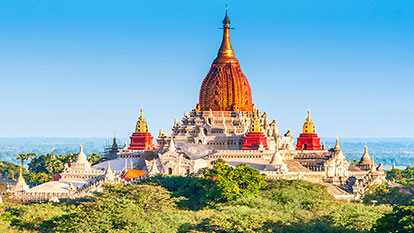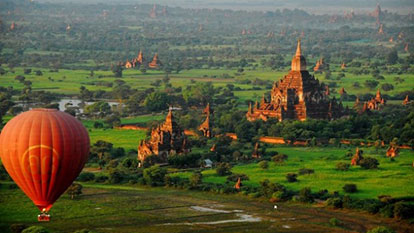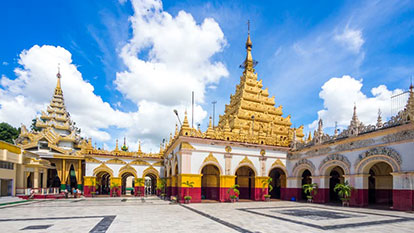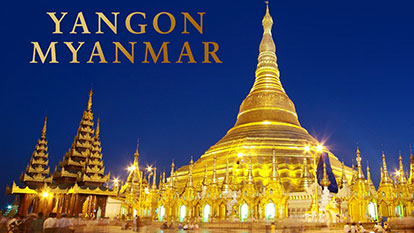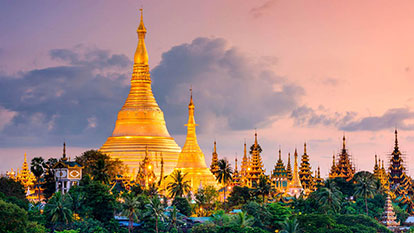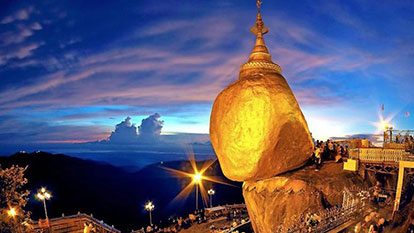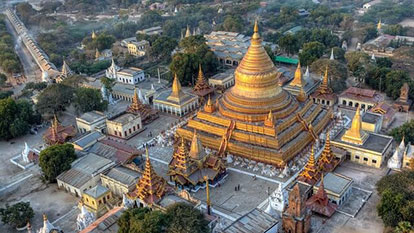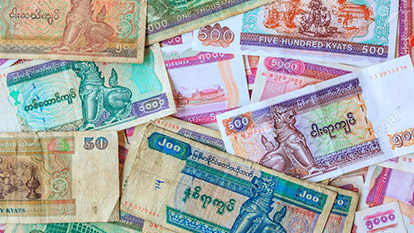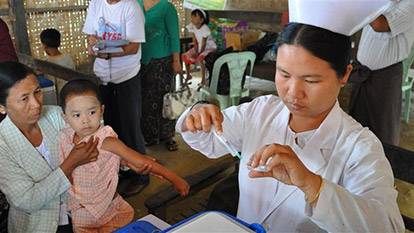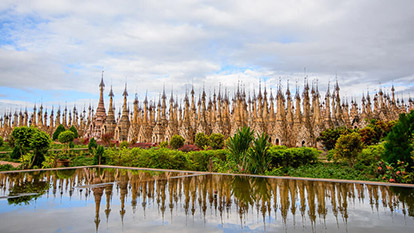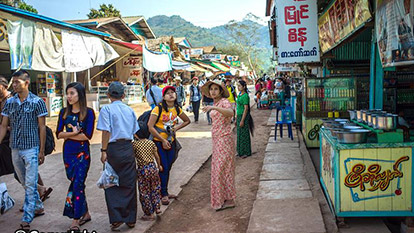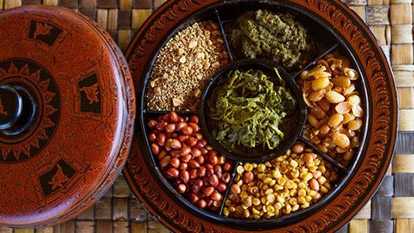Transportation in Myanmar
13/04/2019 1.629 Views
Air:
Air travel is an efficient and relatively cheap way to get around Myanmar, and is particularly appealing given that bus and train journeys between major tourist sites tend to be long and often uncomfortable. The state-owned Myanma Airways (www.myanmaairways.aero) covers all major domestic routes including some out-of-the-way places. Private airlines include Air Mandalay (www.airmandalay.com), Yangon Airways(www.yangonair.com), Air KBZ (www.airkbz.com), Aisan Wings (www.asianwingsair.com), Golden Myanmar Airlines (www.gmairlines.com) and Air Bagan (www.airbagan.com). These cover all the main tourist destinations, including Heho (for Inle Lake) and Nyaung U (for Bagan).
Air notes:
Many of the airlines operating in Myanmar had strong links to the military junta, and some of the owners have been subject to international economic sanctions.
Flight times:
From Yangon to Mandalay or Nyaung U (for Bagan) takes 55 minutes; to Heho is 1 hour 10 minutes.
Road:
With trains slow and unreliable, road travel is the best way to get around if you are on a budget. It is worth noting, however, that many routes are off-limits to foreigners – usually when they run through sensitive border areas or regions where the government is in conflict with ethnic minority militias.
Side of road: Right
Road quality:
Many roads are poorly maintained and can become impassable in the rainy season, from May to October.
Road classification:
The best highway in the country is the Yangon–Mandalay Expressway, which runs largely parallel to the older National Highway 1. Most roads are not classified.
Car hire:
The amount of bureaucracy involved means that foreigners very rarely hire self-drive cars: you’d need a special permit and to have a local with you in the car at all times. It’s easy enough, however, to hire a car and driver for a day or more.
Taxi:
Taxis are easily available in Yangon, Mandalay and a few other large cities and popular tourist destinations. In Yangon there are blue government taxis with set fares. Taxi drivers do not expect a tip and it is wise to pre-arrange fares. Elsewhere, motorbike taxis (where passengers ride pillion) are more common, alongside pick-ups (small pick-up trucks with seating in the back, running set routes) and cycle rickshaws (which have a sidecar).
Bike:
It’s possible to hire bicycles in most towns visited by tourists, usually from accommodation or travel agents although in some places – Bagan and Nyaungshwe for example – there are several separate rental outlets. The bikes are usually quite basic and/or old, and are generally used for day trips and short rides around town rather than for multi-day rides.
Coach:
Long-distance buses are usually cheaper and faster than trains running the same route. Most buses run overnight, typically arriving at an inconvenient pre-dawn hour.
Regulations:
There is no legal requirement to use seat belts, and they may not be provided. Motorcycles have been completely banned from the streets of central Yangon. There are also some places, such as Bagan, where foreigners are not allowed to hire motorbikes. Visitors must remember that, under Burmese law, the driver of a car involved in an accident with a pedestrian is always at fault.
Breakdown service:
There is no national breakdown service.
Documentation:
Foreign licences are not accepted, but an International Driving Licence can be exchanged for a local driving licence at the Department for Road Transport and Administration in Yangon.
Getting around towns and cities:
Yangon has a circular rail service for commuters, which is a great way to see daily suburban life. There are also antiquated and overcrowded bus services in some cities; more common are pick-ups, small trucks with seating at the back which cover fixed routes. Unmetered taxis, usually cars or motorbikes, are available in cities, as are cycle rickshaws; it is wise to pre-arrange fares.
Rail:
The state-run railway serves most of Myanmar, with the principal line being Yangon to Mandalay (journey time 16 hours). The two main classes are ordinary and upper (with reclining chairs), although some trains have first class (between the two) and oversubscribed sleeper carriages. Services are regularly afflicted with delays caused by climatic, technical and bureaucratic difficulties. In addition visitors should be aware that much railway equipment is decrepit and journeys are often uncomfortable.
By rail note:
US dollars must be used when purchasing tickets.
By water:
Myanmar has about 8,000km (5,000 miles) of navigable rivers, and one of the best ways to see the country is by boat. The most popular route is Mandalay-Bagan, as tourist boats run it regularly, but on other routes (such as Bhamo-Mandalay) visitors instead travel with locals. There are also a few very upmarket river cruise boats on the Irrawaddy River.
By water note:
In some areas, foreigners are allowed to travel by water but not by land. Taking a ferry therefore gives a chance to get off the beaten track.
Air travel is an efficient and relatively cheap way to get around Myanmar, and is particularly appealing given that bus and train journeys between major tourist sites tend to be long and often uncomfortable. The state-owned Myanma Airways (www.myanmaairways.aero) covers all major domestic routes including some out-of-the-way places. Private airlines include Air Mandalay (www.airmandalay.com), Yangon Airways(www.yangonair.com), Air KBZ (www.airkbz.com), Aisan Wings (www.asianwingsair.com), Golden Myanmar Airlines (www.gmairlines.com) and Air Bagan (www.airbagan.com). These cover all the main tourist destinations, including Heho (for Inle Lake) and Nyaung U (for Bagan).
Air notes:
Many of the airlines operating in Myanmar had strong links to the military junta, and some of the owners have been subject to international economic sanctions.
Flight times:
From Yangon to Mandalay or Nyaung U (for Bagan) takes 55 minutes; to Heho is 1 hour 10 minutes.
Road:
With trains slow and unreliable, road travel is the best way to get around if you are on a budget. It is worth noting, however, that many routes are off-limits to foreigners – usually when they run through sensitive border areas or regions where the government is in conflict with ethnic minority militias.
Side of road: Right
Road quality:
Many roads are poorly maintained and can become impassable in the rainy season, from May to October.
Road classification:
The best highway in the country is the Yangon–Mandalay Expressway, which runs largely parallel to the older National Highway 1. Most roads are not classified.
Car hire:
The amount of bureaucracy involved means that foreigners very rarely hire self-drive cars: you’d need a special permit and to have a local with you in the car at all times. It’s easy enough, however, to hire a car and driver for a day or more.
Taxi:
Taxis are easily available in Yangon, Mandalay and a few other large cities and popular tourist destinations. In Yangon there are blue government taxis with set fares. Taxi drivers do not expect a tip and it is wise to pre-arrange fares. Elsewhere, motorbike taxis (where passengers ride pillion) are more common, alongside pick-ups (small pick-up trucks with seating in the back, running set routes) and cycle rickshaws (which have a sidecar).
Bike:
It’s possible to hire bicycles in most towns visited by tourists, usually from accommodation or travel agents although in some places – Bagan and Nyaungshwe for example – there are several separate rental outlets. The bikes are usually quite basic and/or old, and are generally used for day trips and short rides around town rather than for multi-day rides.
Coach:
Long-distance buses are usually cheaper and faster than trains running the same route. Most buses run overnight, typically arriving at an inconvenient pre-dawn hour.
Regulations:
There is no legal requirement to use seat belts, and they may not be provided. Motorcycles have been completely banned from the streets of central Yangon. There are also some places, such as Bagan, where foreigners are not allowed to hire motorbikes. Visitors must remember that, under Burmese law, the driver of a car involved in an accident with a pedestrian is always at fault.
Breakdown service:
There is no national breakdown service.
Documentation:
Foreign licences are not accepted, but an International Driving Licence can be exchanged for a local driving licence at the Department for Road Transport and Administration in Yangon.
Getting around towns and cities:
Yangon has a circular rail service for commuters, which is a great way to see daily suburban life. There are also antiquated and overcrowded bus services in some cities; more common are pick-ups, small trucks with seating at the back which cover fixed routes. Unmetered taxis, usually cars or motorbikes, are available in cities, as are cycle rickshaws; it is wise to pre-arrange fares.
Rail:
The state-run railway serves most of Myanmar, with the principal line being Yangon to Mandalay (journey time 16 hours). The two main classes are ordinary and upper (with reclining chairs), although some trains have first class (between the two) and oversubscribed sleeper carriages. Services are regularly afflicted with delays caused by climatic, technical and bureaucratic difficulties. In addition visitors should be aware that much railway equipment is decrepit and journeys are often uncomfortable.
By rail note:
US dollars must be used when purchasing tickets.
By water:
Myanmar has about 8,000km (5,000 miles) of navigable rivers, and one of the best ways to see the country is by boat. The most popular route is Mandalay-Bagan, as tourist boats run it regularly, but on other routes (such as Bhamo-Mandalay) visitors instead travel with locals. There are also a few very upmarket river cruise boats on the Irrawaddy River.
By water note:
In some areas, foreigners are allowed to travel by water but not by land. Taking a ferry therefore gives a chance to get off the beaten track.
ONLY WITH US : 100 % MONEY BACK GUARANTEE within 10 days from the date of booking if not satisfied.
For further information, or simply a free quote, please contact us at any time via our email: info@galatourist.com, our experienced consultants will reply to you within 48 hours.Sincerely yours & see you soon!
GALATOURIST since 2005.
Related Articles
Explore the Bago fairy city, south of Yangon - Myanmar
If you have visited all the beautiful scenery in Yangon and have no plans to go. So wait, come to the city of Bago right and always !
Top 5 ancient Buddhist temples in Bagan, Myanmar
Anyone who has the passion to explore the mystical beauty of Myanmar when arriving in Bagan can’t fail to visit the monuments of ancient monuments left here. The Buddhist temples that stand along the flow of time are the testimony to the dynasties and Buddhist culture in Myanmar.
The famous tourist destinations of Mandalay, Myanmar
Mandalay is the principal economic and religious city of upper Myanmar. It is situated in the centre of the country and 714 km north of Yangon. It was founded in 1857 by King Mindon, where the Royal Palace of the Konbaung Dynasty is located and it was the last monarchy until being occupied by the British in 1885. Today, Mandalay is still accepted as the art and cultural heartland of Myanmar and one can also discover the history, tradition, ritual and ceremonies there. Moreover, it is also easily accessible to Sagaing, Ava (Inwa), Amarapura, Mingun and Pyin Oo Lwin.
Attractive and impressive experiences in Yangon, Myanmar
Yangon is one of famous places in Myanmar, where well-known tourist attractions, tourist services are diverse and attractive. If you want to enjoy adventure travel in Yangon Myanmar, you should read the post carefully to known about wonderful experiences in there.
The Shwedagon Pagoda in Yangon
The Shwedagon Pagoda is one of the most famous pagodas in the world and it is certainly the main attraction of Yangon, Myanmar’s capital city.
The Golden Rock - Kyaiktiyo
The Golden Rock (Kyaik-htiyo or Kyaiktiyo), perched atop a cliff near Yangon, is one of the most sacred sites in Burma. The great boulder precariously balances on the edge of a cliff and is topped by a small stupa. An endless stream of pilgrims come to admire the sight and add squares of gold leaf to its surface.
The Shwezigon Pagoda of Bagan
Gold plated pagoda built by the founder of the Bagan empire. The Shwezigon Pagoda is one of the oldest and most impressive monuments of Bagan. Most noticeable is the huge gold plated pagoda glimmering in the sun. The design of the Shwezigon Pagoda has been copied many times across Burma over the centuries.
Myanmar Currency & Money
Riel (KHR; symbol CR) is the country’s official currency but locals prefer to use dollars. Riel notes are in denominations of CR100,000, 50,000, 20,000, 10,000, 5,000, 2,000, 1,000, 500, 200, 100 and 50. Dollars notes (not coins) are widely accepted, yet visitors in small villages and shops vendors may not have change for high notes (including $10+). It is advisable to keep hold of small Riel change wherever you can as it is very useful.
Myanmar Health Care and Vaccinations
There are hospitals and clinics in cities and larger towns, and regional health centres in outlying areas, although the quality of healthcare is generally low in Myanmar. Many hospitals lack basic equipment and medication, a situation not helped by high levels of corruption, and international-standard facilities
Things to see and do in Myanmar
The small town of Hpa-an, in the southeast of the country, is a pleasant place to spend a few days. Moreover there are some excellent day trips from the town, and you can take a taxi or ride a rented motorbike through scenic rice fields to swimming holes, a pagoda perched on a vertical column of rock, and caves full of Buddhist art.
Myanmar Shopping and nightlife
Myanmar’s cities are not shopping destinations on a par with regional favourites such as Bangkok or Singapore, but there are still some bargains to be found. Souvenirs include jewellery – some of the most interesting being made from petrified wood or from jade
Myanmar Food and Drink
The regional cuisine balances spicy, sour, bitter and salty flavours; it can be quite hot but rarely as much so as Thai food. Common local ingredients include fish, seafood, chicken and vegetables spiced with onions, ginger, garlic and chillies, served with rice or noodles
Testimonials
The following are the real customer reviews about GalaTourist by video clips, email & feedback form, etc... please check it out!

Ms. Francesca Tronconi & Mr Vizzolini Davide (2pax) from Spain
Ms. Francesca Tronconi & Mr Vizzolini Davide from Spain, taked a Tour in Vietnam on 8.2018

Mrs & Mr. DUPUIS (2pax) from United States
Mrs & Mr. DUPUIS from US taked a vacation of THAILAND & CAMBODIA & VIETNAM 14 days on 3.2018

Mr. Jeffrey Szymanski (2pax) from United States
They taked a trip of Vietnam and Cambodia 11 days on 3.2018

Mrs Rosemary McGuinness (2pax) from Australia
Taking a trip of Vietnam & Cambodia 14 days on 26th mars 2018

Mrs Elena Maria Sanchez (2pax) from Spain
Mrs Elena Maria Sanchez from Spain taked a trip in Vietnam on 1.2016

Group Marissa (4pax) from United States
Group Marissa 4pax from USA taked a Trip in Vietnam on 2.2016

Mr Jerzy (2pax) from Canada
Mr Jerzy from Canada have traveled in Vietnam on 3.2016

Mr Ricardo Velasco (8pax) from Argentina
Sr Ricardo Velasco 8pax - Argentina taked a trip to Vietnam Cambodia Thailand on 2016.




